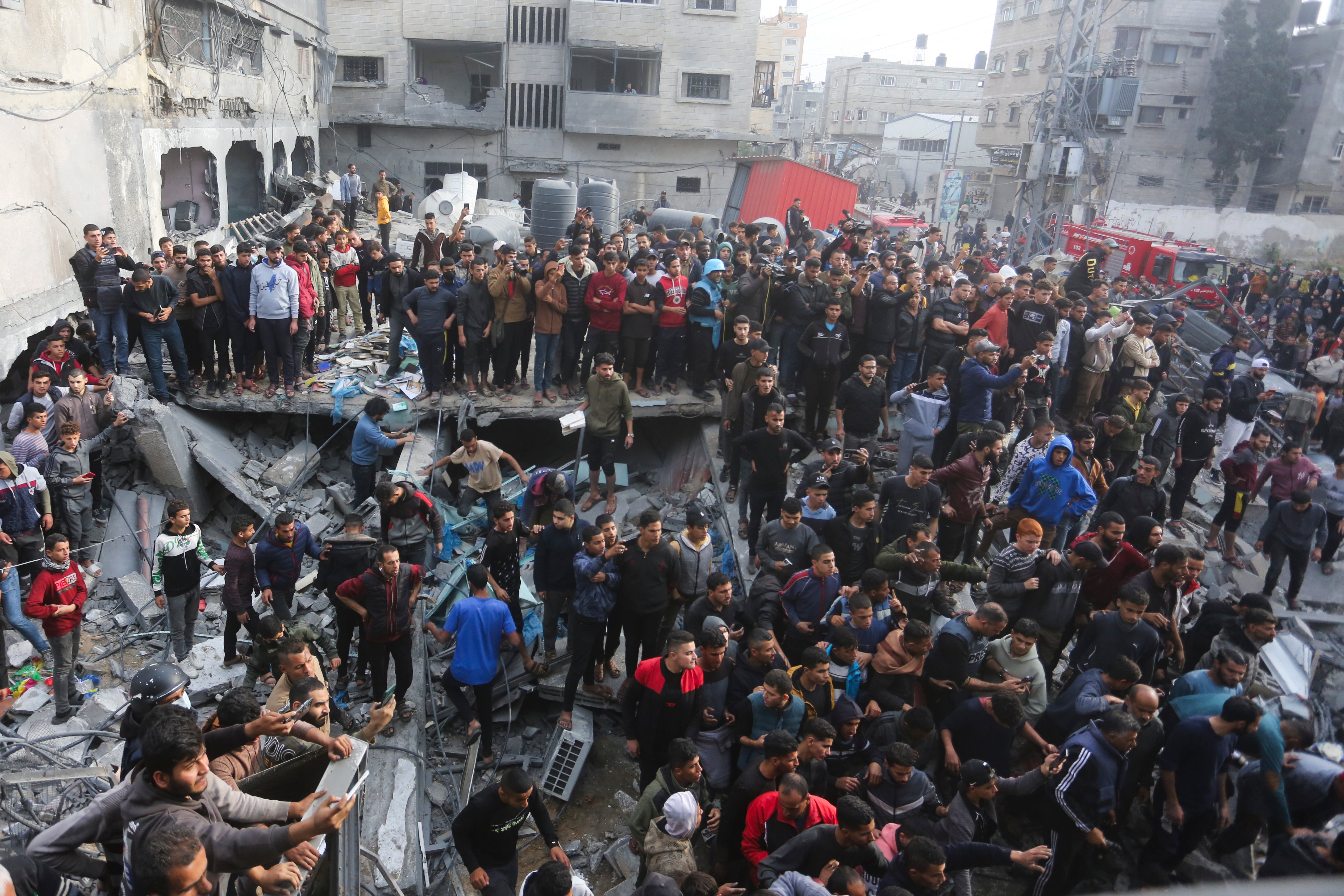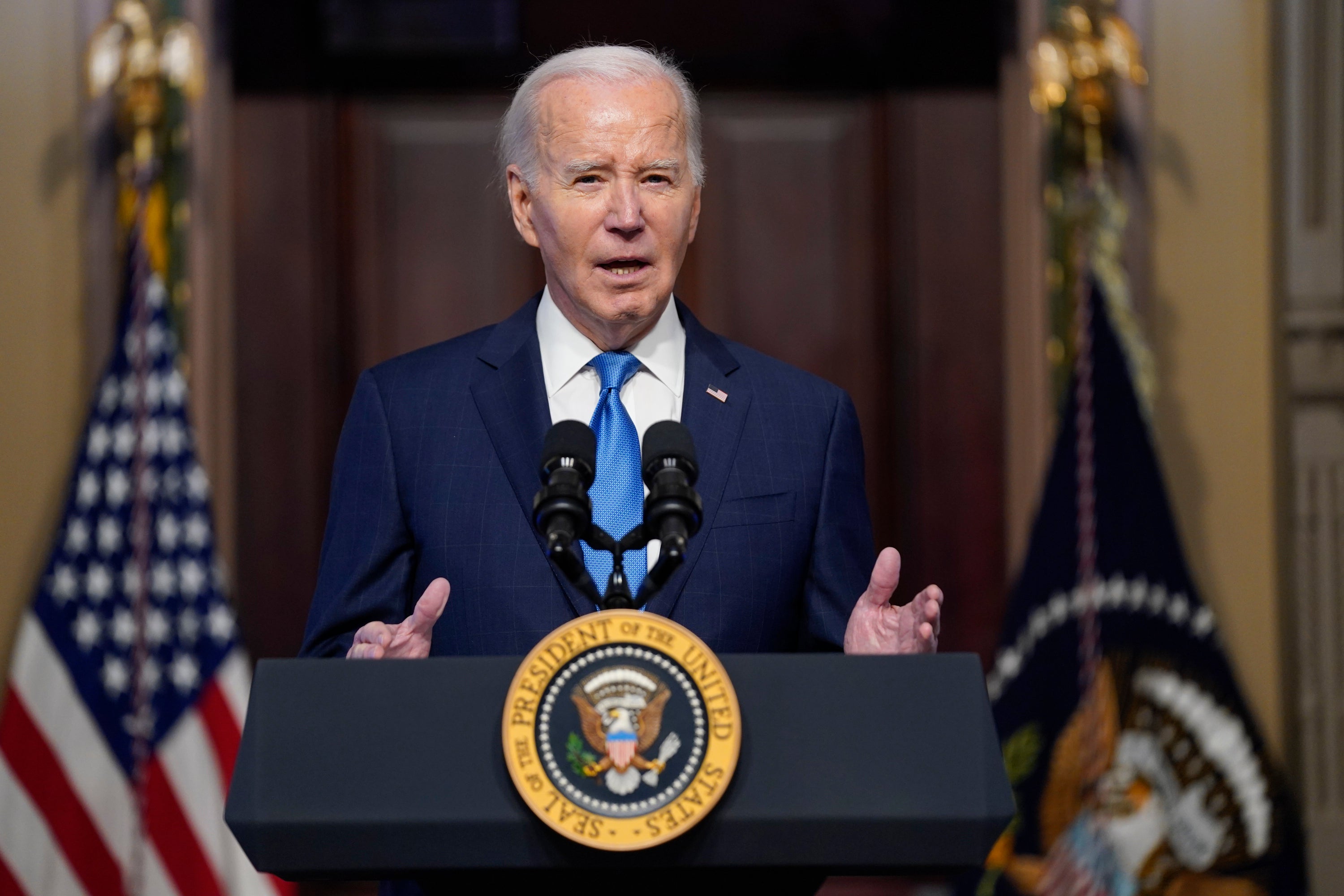Hamas leader visits Egypt for Gaza ceasefire and hostage release talks
Israel open to negotiations as Joe Biden says US is pushing for deal – but he doesn’t expect it soon

Your support helps us to tell the story
This election is still a dead heat, according to most polls. In a fight with such wafer-thin margins, we need reporters on the ground talking to the people Trump and Harris are courting. Your support allows us to keep sending journalists to the story.
The Independent is trusted by 27 million Americans from across the entire political spectrum every month. Unlike many other quality news outlets, we choose not to lock you out of our reporting and analysis with paywalls. But quality journalism must still be paid for.
Help us keep bring these critical stories to light. Your support makes all the difference.
The leader of Hamas has paid a visit to Egypt for talks on a new ceasefire in Gaza, part of a flurry of diplomacy aimed at securing a fresh truce and the release of hostages.
Ismail Haniyeh, usually based in Qatar, typically only makes such interventions when progress seems likely. He last travelled to Cairo in early November before the announcement of a temporary ceasefire which turned into week-long pause. That saw the release of around 100 of the 240 hostages taken by Hamas during their attack inside Israel on 7 October which killed 1,200 people.
In response to that attack, Israel has been bombarding Gaza from the air, alongside ground operations and a blockade that has left stocks of food, water, fuel and medical supplies running low. Health officials in the Hamas-run Strip say that 20,000 people have been killed since Israel’s military operations began.
A source briefed on negotiations in Egypt told Reuters that discussions centred around which of the hostages still held by Palestinian Islamist militants in Gaza – Hamas and other groups – could be freed in a new truce, and which prisoners Israel might release in return. Egypt and Qatar played a key role in mediating that previous truce.
Israeli media reports say that Israel has presented a plan to mediators which could secure the release of some 30 to 40 hostages in return for a week-long ceasefire. This prioritises the remaining women, as well as men who are elderly or in need of urgent medical care. It is thought they could be exchanged for Palestinians held in Israeli prisons on more serious offences than the women and children released under the previous deal.
Both Israel and Hamas are still poles apart in their public statements about a deal. Hamas rejects any further temporary pause and says it will discuss only a permanent ceasefire. Israel has ruled that out and says it will agree only limited humanitarian pauses until Hamas is defeated. The Israeli president, Isaac Herzog, said on Tuesday that Israel was ready for “another humanitarian pause, and additional humanitarian aid in order to enable the release of hostages”.
US president Joe Biden said later on Wednesday he did not expect an Israel-Hamas deal for the release of hostages held in Gaza to be struck soon. "We're pushing," Mr Biden told reporters during a trip to Milwaukee.

Israeli prime minister Benjamin Netanyahu repeated his regular refrain that the war would end only with Hamas eradicated, all hostages freed and Gaza posing no more threat to Israel. “Whoever thinks we will stop is detached from reality ... all Hamas terrorists, from the first to the last, are dead men walking,” he said in a statement.
But international pressure has been growing for a fresh ceasefire and Israel has faced pressure, even from staunchest ally America, to reduce civilian casualties in Gaza. US Secretary of State Antony Blinken said on Wednesday that Washington expects Israel to shift its military operations to a lower-intensity phase during which there will be more targeted operations focused on the Hamas leadership and its infrastructure. “As that happens, I think you’ll see as well the harm done to civilians also decrease significantly,” Mr Blinken said.
The Israeli military is trying to gain control of as much ground in Gaza as possible before the political pressure becomes too much and it has to slow down operations. Israel Channel 13 television claimed the military had twice in recent days found a recent hiding place in Hamas’s tunnel system, used by Yahya Sinwar, the militant group's leader in Gaza, but that he had fled just in time on both occasions.
Since the last truce collapsed at the beginning of the month, the war has entered a more intensive phase, with ground combat previously confined to the northern half of the Gaza Strip now spread across the length of the territory. International aid groups say 85 per cent of Gaza’s 2.3 million people have been forced from their homes and face dire conditions. Israel has called on residents to keep moving south, putting extra pressure on cities such as Khan Younis and Rafah. There has been intense fighting around the centre of Khan Younis, which Israeli forces have partly stormed.
In New York, The UN Security Council again delayed a vote on a new UN resolution on desperately needed aid to Gaza until Thursday. The US seeks to change the text’s references to a cessation of hostilities in the Israel-Hamas war, and a clause about putting the United Nations in charge of inspecting trucks to ensure they are actually carrying humanitarian goods, which Israel opposes.
Mr Blinken said that the US has engaged intensively and “in very good faith” in negotiations on the resolution, “so I hope we can get to a new place.”
Subscribe to Independent Premium to bookmark this article
Want to bookmark your favourite articles and stories to read or reference later? Start your Independent Premium subscription today.
Join our commenting forum
Join thought-provoking conversations, follow other Independent readers and see their replies
Comments